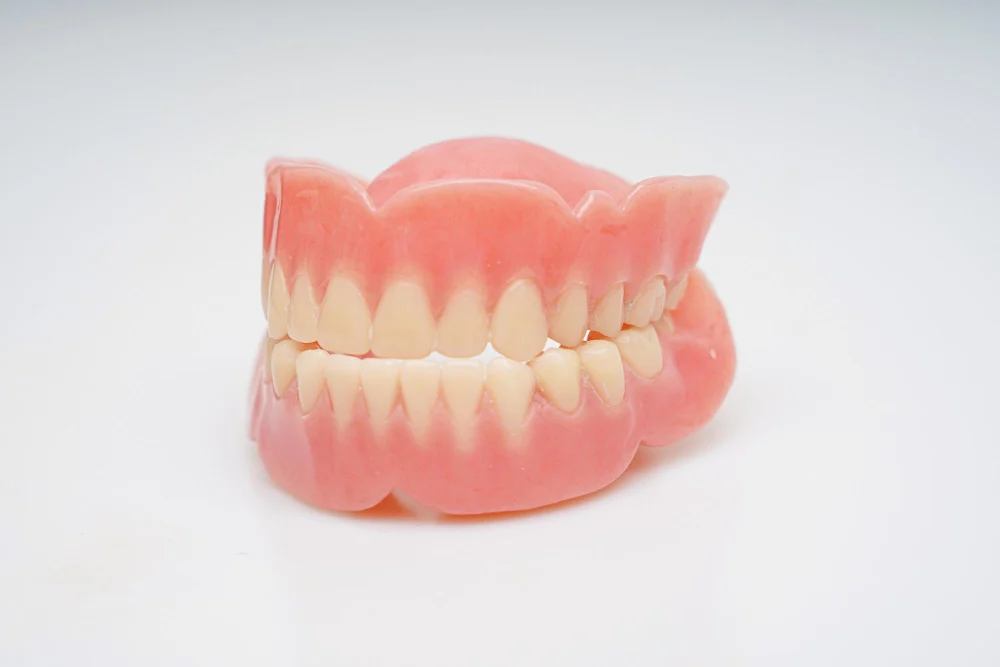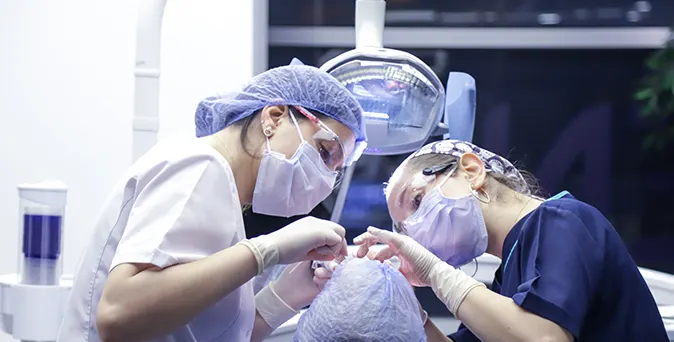Table of content
Missing teeth happen more often than you might think. We’ve seen them in children, seniors, and even in teens and adults. No matter the age, missing teeth cause all kinds of trouble. They can make eating tough, speaking awkward, and smiling feel like something to hide.
Dentures are one of the best ways to fix the problem. But many people come to us with the same concerns. Will the dentures look natural? Will they stay in place? Are they affordable? And will they feel comfortable?
The truth is, there are different types of dentures, and each one has its own strengths. That means there is a denture option for almost everyone.
In this article, we’ll break down six common types, share their costs, reveal their pros and cons, and answer a few questions you may already be thinking about.
But first: Let’s help you figure out if dentures are the right fit for your needs
Should You Get Dentures?
IIf you’re missing teeth, having trouble eating or speaking, or feeling hesitant to smile, dentures might be exactly what you need. For many patients, choosing between immediate dentures and permanent dentures is a key part of finding the right solution.
To help you make an informed choice, we’ve created a comprehensive guide comparing Immediate and Permanent Dentures—including their pros, cons, and costs.
Dentures may be a great option if:
- You’ve lost most or all of your teeth.
- You’re finding it harder to eat, speak clearly, or smile without feeling self-conscious.
- You’re dealing with severe tooth decay or damage.
However, not everyone is automatically eligible for dentures. The right candidate usually has healthy gums and enough jawbone structure to support them safely and comfortably.
In the end, the best way to know for sure is to schedule a consultation with your dentist. A professional evaluation will help determine if dentures are right for you—and which type suits your needs best.
6 Types of Dentures
Let’s break down the most common types of dentures, what makes them different, and which one could be the best fit for your needs.
Complete (Full) Dentures
Complete dentures are designed for folks who have lost all the teeth in their upper jaw or lower jaw (or both!). They sit on your gums and are held in place by suction or denture adhesive.
A lot of folks worry these will look fake, but today’s full dentures are custom-made to blend in with your mouth. It comes with realistic gum design and artificial teeth that mimic the look of natural ones.
We love these dentures because you can take them out before you sleep or when you want to clean them.
| Pros | Cons |
| Replaces all missing teeth and restores your facial structure | May feel sore or uncomfortable at first |
| Affordable compared to other full-tooth replacements | Needs periodic relining or replacement due to gum changes |
| No surgery required | Can affect taste, especially in the upper arch |
| Boosts appearance and confidence | Adhesive may be needed for more stability |
Partial Dentures
If you still have some healthy teeth, a partial denture might just be what you need. Partial dentures fill in the gaps without removing your remaining teeth.
These have a gum-colored base with one or more replacement teeth, usually held in place with small clasps that hug your natural teeth. This type keeps your remaining teeth from drifting and lets you chew and speak like normal.
| Pros | Cons |
| Keeps your remaining natural teeth in place | Metal clasps might be visible when smiling |
| Less invasive than bridges or implants | Can feel less stable than fixed options |
| Affordable for multiple missing teeth | Requires diligent cleaning around clasps and teeth |
| Easy to modify if more teeth are lost later | May need adjustments over time |
Immediate Dentures
No one likes the idea of walking around without teeth, even for a day. That’s where immediate dentures come in. These are made in advance and placed in your mouth right after your natural teeth are extracted, so you never have to go without a smile.
Keep in mind, though. As your gums heal and shrink over the next few months, these dentures will loosen and need relining or replacement with a more permanent set.
| Pros | Cons |
| You walk out with teeth the same day as extractions | Fit may become loose quickly as gums heal |
| Protects your gums during healing | Often requires a new denture later |
| Helps maintain normal appearance and speech | Slightly more expensive than conventional dentures |
| Allows early adaptation to dentures | May cause swelling when removed |
Implant-Supported Dentures
Implant-supported dentures combine the stability of implants with the coverage of dentures. Instead of resting on your gums, the denture snaps onto dental implants that are surgically placed in your jaw.
It comes in removable (snap-in) and fixed (permanent) options. Removable ones can be taken out for cleaning, while fixed dentures stay in your mouth like natural teeth.
Besides being more secure and natural-looking, this type of denture also offers impressive durability—typically lasting 10 to 15 years, and sometimes even longer.
One advanced option we provide is the Malo Bridge dental implant, a high-end fixed denture known for its strength, aesthetics, and long-term performance. In fact, this particular implant-supported denture comes with a 25-year warranty, making it one of the most reliable choices available today.
| Pros | Cons |
| Stays securely in place | Most expensive option |
| Feels more like natural teeth | Requires oral surgery and healing time |
| Helps preserve jawbone and facial shape | Not suitable for everyone due to health or bone structure |
| Lasts long. Up to 10 – 15 years. | Maintenance is required for implant parts |
Overdentures
An overdenture is a type of denture that fits over a few remaining teeth or dental implants. If you still have a few strong natural teeth left, they can be used as anchors to help hold the denture in place. Or, if you’ve chosen implants, the overdenture can snap onto those instead.
These dentures provide better stability than traditional ones and can help preserve bone and gum health. They are removable, easy to clean, and more comfortable for many people.
| Pros | Cons |
| Better stability than regular dentures | More expensive than traditional dentures |
| Can use natural teeth or implants as support | Attachments may wear out and need replacement |
| Preserves bone and supports facial structure | May require more dental visits and maintenance |
| Comfortable and secure fit | Not everyone qualifies due to bone or tooth health |
Flexible Dentures
Flexible dentures are bendable partial dentures made from nylon. They don’t have metal clasps, which means they’re hard to spot.
These are a good choice for folks who are allergic to metal or want a less bulky replacement for the teeth they’ve lost.
Just note that they aren’t very easy to repair and or adjust.
| Pros | Cons |
| Soft, comfortable, and gentle on gums | Not suitable for large tooth replacements |
| Very natural-looking with no metal showing | Difficult to repair or reline |
| Durable and flexible material resists breakage | May harbor bacteria if not cleaned thoroughly |
| Great for metal allergies | May not provide the same chewing support as rigid partials |
How to Get the Best Type of Dentures
The best dentures for you are the ones that fit your specific needs. That means it must respond to your level of tooth loss, your overall dental health, your budget, how comfortable you want to feel, and how much time you have to adjust.
To get that perfect match, you need the right clinic in the right location. The more advanced the clinic, and the more dentally inclined the location, the better your results. That is why so many people look to Turkey. It is one of the most dental-forward countries in the world. And within Turkey, one name stands out above the rest.
DentSpa.
Our team includes Professors and PhD-level experts with decades of combined experience in dentistry. they are highly skilled in using a wide range of state-of-the-art dental technologies.
Expertise aside, we also offer a calming environment. From the moment you walk into our clinic, the calming atmosphere will ease your anxiety and make you feel at home.
With all these, it’s no surprise we were named the Best Dental Clinic in Europe.
Schedule a free online consultation, an in-office visit, or simply contact us on WhatsApp if you have any questions or need assistance.
















 70%
70% 

